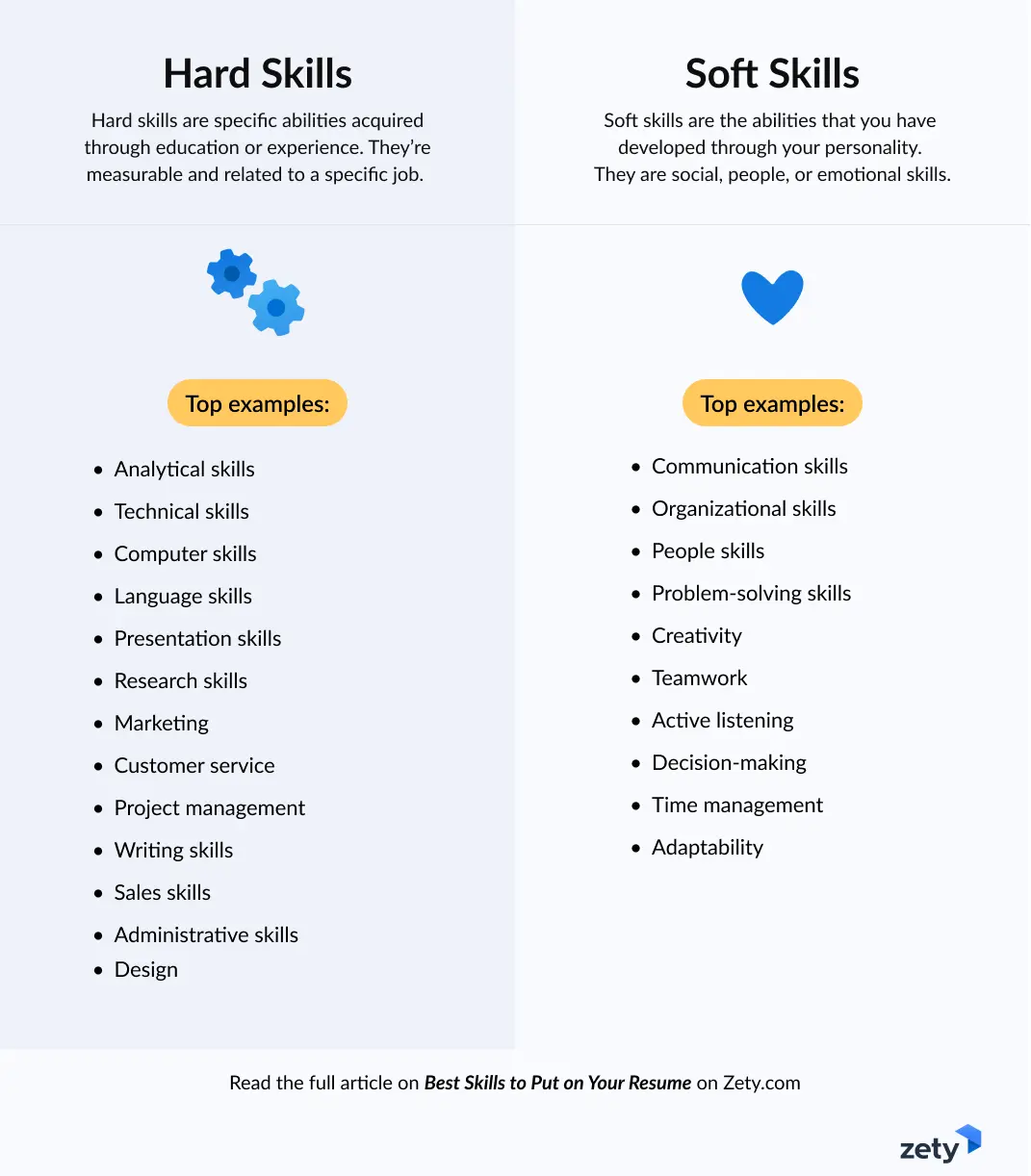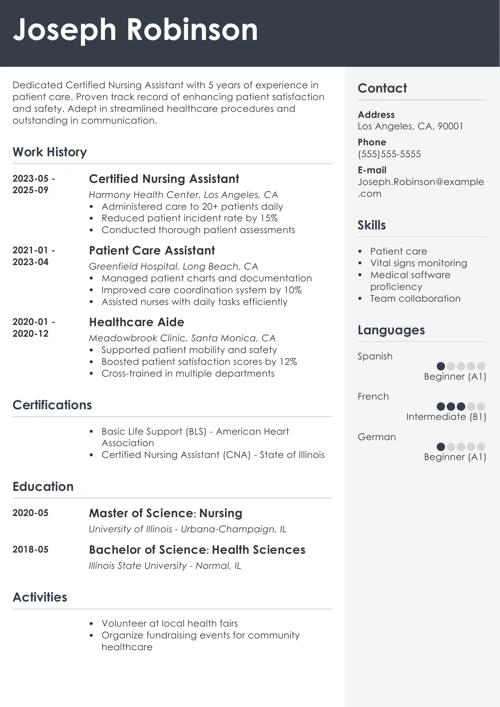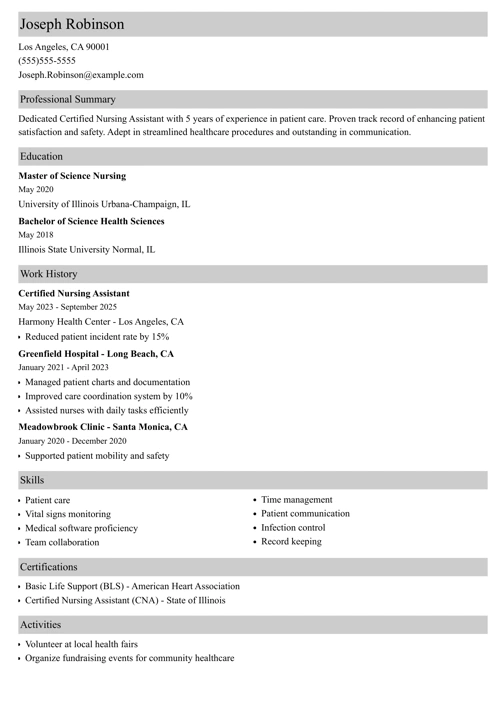In a sea of applicants, your skills are your chance to say, “Here’s what I’m really good at—and why you should care.” Whether you’re a creative problem-solver, a spreadsheet wizard, or someone who can lead a team through chaos, the right skills can move your resume from “meh” to “must-see.”
Let’s break down which skills employers actually want to see—and how to showcase them like a pro.
You’ve been tinkering with that skills list for hours, even though you didn’t need to. Instead, you could use the Zety resume builder and simply drag & drop the skills onto your resume template. So go ahead. Pick one and create a resume that’ll get you the job you actually want.
Sample resume made with our builder—See more resume examples here.
Best Skills to List on a Resume
Deciding on what good skills to put on a resume is all about aligning what you can do with the employer's needs. Here are 10 of the most sought-after skills you can include in your resume:
Communication
Being a good communicator means you can share your ideas clearly and listen to others. Whether you're writing, talking, or using body language, strong communication skills help you work well with your team, boss, and customers.
Problem-solving
Problem-solving skills help you notice issues, think of possible solutions, and take action. People who are good at solving problems are reliable and can often work on their own.
Time management
Time management skills are not just about avoiding distractions. It means using your time wisely. People with good time management know what to do first and how to break big jobs into smaller steps to get things done right and on time.
Attention to detail
Attention to detail means catching small mistakes that others might miss. Workers with good attention to detail deliver high-quality work.
Analytical thinking
Collecting, organizing, visualizing, and assimilating data are all connected to analytical skills. These skills help you understand information, find patterns, and solve problems. They're useful for jobs that involve working with data and making important decisions.
Computer skills
Knowing how to use computers is a must for most jobs today. Computer skills can include typing, using programs like Word or Excel, organizing files, or even understanding how hardware works.
Language skills
Multicultural workplaces are more common than ever. Having someone who speaks more than one language is a huge plus for most employers. If you have multiple language skills, you should definitely include them in your resume.
Research
Research skills help you find the right information to make smart choices. It means knowing how to look things up, understand what you find, and use it to solve problems. Strong research skills contribute to evidence-based insights, innovation, and strategic planning.
Administrative skills
These are skills that help you stay organized, like managing calendars, keeping records, or writing emails. They keep workplaces running smoothly.
Technical skills
Technical skills are required to perform specific, job-related tasks and are learned through on-the-job experience. These skills range from specific software to handling technical machinery. Research the technical skills your target job needs and add them to your resume.
Creating a resume with our builder is incredibly simple. Follow our step-by-step guide and use content from Certified Professional Resume Writers to have a resume ready in minutes.
When you’re done, Zety’s resume builder will score your resume and our resume checker will tell you exactly how to make it better.
Hard Skills vs Soft Skills
Every resume needs a balanced mix of soft and hard skills. Employers want a well-rounded candidate who can do the job and promote a healthy workspace. But how can you tell the difference between these resume skills? Let's review them:
Hard skills refer to specific, job-related abilities earned through education or experience. They're teachable, measurable, and allow you to do your job duties.
Imagine you're a customer representative. In that case, your hard skills would be:
- CRM software (e.g. Salesforce, Zendesk, HubSpot)
- Product knowledge
- Data entry
Soft skills are universal abilities that can be applied to most jobs and industries. These skills are typically personality traits that help you be a better teammate or that describe your work style.
For example, these would be your customer representative's soft skills:
- Communication
- Adaptability
- Multitasking
While hard skills are essential for job-related tasks, soft skills are crucial for collaboration and navigating team dynamics in the workplace. On resumes, hard skills show what you can do. Soft skills say how you’ll perform your duties.

How to List Skills on a Resume
Having a great list of skills for resumes is one thing. But presenting them in your resume is also important!
Let’s find out the best way to include skills when writing your resume:
Tailor your skills to the job posting
Read the job description carefully to see which skills the employer is looking for. If you have these skills, include them throughout your resume. Tailoring your resume to the job posting will help you pass ATS scans and get your application into the recruiter's hands.
Tailoring your skill set to match the employer's needs not only showcases your qualifications but also increases your resume's chances of passing through applicant tracking systems (ATS). Also, make sure to regularly update your skills section to reflect new competencies and trends in your industry. This ensures your resume stays relevant and shows employers you are committed to continuous professional development.
Weave skills into your summary
Whether a resume summary or an objective statement, this introduction lives at the top of your resume. The key is to mention your most relevant skills to grab the employer's attention. For example:
Personable customer service representative with strong communication, problem-solving, and multitasking skills. Skilled in using CRM software to manage customer interactions efficiently. Known for delivering high-quality service by actively listening, resolving issues quickly, and maintaining a calm, empathetic tone in high-pressure situations. Eager to contribute to a customer-focused team and help build lasting client relationships that improve customer satisfaction.
Show your skills with work accomplishments
Your work experience is where you prove you can apply your skills to real-life situations. Listing your job duties will show your skills, but accomplishments confirm the impact of said skills.
If you can, add achievements with numbers and percentages that back them up. Here's an example:
Customer Service Representative
ABC Solutions, Orlando, FL
June 2021 - May 2025
- Maintained a 98% customer satisfaction score over 12 months by consistently resolving issues on the first contact and providing clear follow-up communication.
- Reduced average call resolution time by 22% by developing a personal knowledge base of product FAQs and solutions.
- Trained and mentored five new team members, improving onboarding efficiency and reducing training time by 30%.
Create a detailed skills section
Your skills section is straightforward. Simply list your strongest skills, but be detailed in your descriptions. Want to say you have good communication skills? Write "strong written and verbal communication" instead. You can even include your skill level with words like "Basic", "Intermediate," or "Advanced."
See this example:
- Advanced written and verbal communication
- Customer relationship management (CRM) software
- Advanced conflict resolution
- Time management
- Intermediate data entry and documentation
- Advanced product knowledge
- Intermediate technical support
Resume Skills Examples By Job Title
Below you'll find five popular job roles with their key resume skills to guide you when creating your own.
|
Job Title |
Hard skills to include on resume |
Soft skills to list on resume |
|
Software engineer |
Programming (Python, Java, C++), Algorithms, SQL, Cloud computing, Debugging |
Problem-solving, Teamwork, Attention to detail, Analytical thinking, Time management |
|
Registered nurse |
Patient care, Electronic Medical Records (EMR), Medication administration, Triage, Wound care |
Empathy, Communication, Time management, Adaptability, Stress management |
|
Project manager |
Agile methodologies, Budgeting, Risk management, Scheduling, Process improvement |
Leadership, Decision-making, Adaptability, Conflict resolution, Critical thinking |
|
Marketing manager |
SEO, Social media management, Data analytics, Content strategy, Email marketing |
Creativity, Persuasion, Collaboration, Strategic Thinking, Negotiation |
|
Customer service representative |
CRM software, Data entry, Product knowledge, Order processing, Troubleshooting |
Active listening, Conflict resolution, Patience, Multitasking, Emotional intelligence |
Key Takeaways
Remember these key points when adding skills to your resume:
- The best skills for your resume are those that showcase your abilities and align with the employer's needs.
- Hard skills are teachable, measurable, and job-specific.
- Soft skills refer to personality traits and how you will perform your job duties.
- When deciding which skills to add, review the job posting.
- Your most relevant skills should be in your summary to quickly catch a recruiter's eye.
- Use quantifiable accomplishments to show how you apply your skills.
- Be detailed in your skills section with descriptive words.
About Zety’s Editorial Process
This article has been reviewed by our editorial team to make sure it follows Zety's editorial guidelines. We’re committed to sharing our expertise and giving you trustworthy career advice tailored to your needs. High-quality content is what brings over 40 million readers to our site every year. But we don't stop there. Our team conducts original research to understand the job market better, and we pride ourselves on being quoted by top universities and prime media outlets from around the world.




